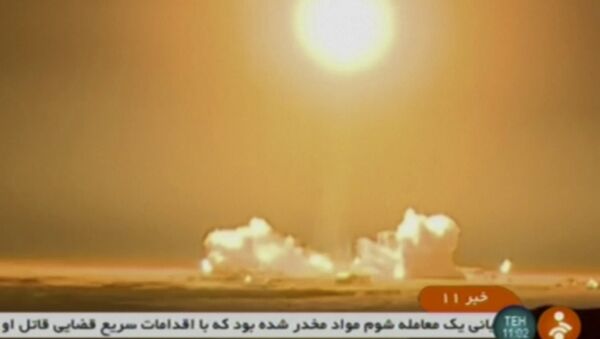One domestically developed satellite is ready for launch and two more are in “final preparation,” Hadi Rezaei, deputy head of research and technology at the Iranian Space Research Centre, has announced.
Scientists and engineers successfully created and built the satellites in spite of tough sanctions affecting Iran’s ability to procure advanced technologies abroad, the official noted.
“Despite all the aforementioned restrictions, due to the efforts of ISRC researchers and the cooperation of other scientific and research centres in the country [work on] one satellite has been completed and it is ready for launch, while a measurement satellite and telecommunication satellite are in their final preparation stages,” Rezaei said, speaking to the Islamic Republic News Agency on Sunday.
According to the official, Iran’s advances in this area are the result of Western import restrictions on advanced technologies, which have forced the country to build up its own scientific and technological potential, to train specialists and to create jobs in the field. The Iranian Space Research Centre is now cooperating with 11 Iranian universities and over 300 knowledge-based and private sector companies, Rezaei noted.
Known for its advances in the field of missile technology, Iran is also a fledgling space power, launching its first domestically-created satellite in 2009, and successfully launching a biological payload into orbit in 2011. In late 2013, Iran launched a monkey into orbit, retrieving it after a 15 minute flight. In early 2015, Iran launched another satellite into orbit.
The US has repeatedly demanded that Iran desist from launching satellites into orbit, considering such launches a violation of the United Nations resolution endorsing the 2015 Iran nuclear deal and a form of “continued ballistic missile development.” Iran has dismissed these claims, saying its peaceful space program has nothing to do with the nuclear deal, which doesn’t restrict the development of rocket and missile technology.

In January, Iran attempted to launch a domestically-developed environmental data-gathering satellite, but the launch failed and the satellite crashed into the Indian Ocean. The US and its European allies criticised the launch, with Secretary of State Mike Pompeo claiming that the rockets used in satellite launches posed a threat to Europe and the Middle East. Iranian Foreign Minister Mohammed Javad Zarif dismissed these allegations.
In February, Iran reportedly made a second satellite launch attempt, which also failed. Speaking to US media, Zarif said it was “quite possible” that the US was sabotaging his country’s space programme.
Late last week, the Pentagon said that Iran had test-fired a new medium-range ballistic missile amid tensions in the region over a downed US drone, the detention and sabotage of tankers in the Persian Gulf, and broader military tensions between Washington and Tehran. On Saturday, an Iranian military official told media that the country’s missile tests were “entirely defensive,” and aimed only as a response “to possible aggression against the country’s territorial integrity.”




